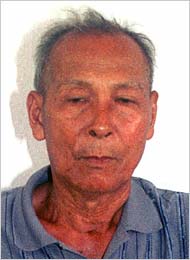During the period in which the Khmer Rouge were fighting imperialism they had many supporters. When Democratic Kampuchea and its excesses were revealed these people shrank to a small fringe, among them Malcom Caldwell.
Who was Malcolm Caldwell
Born in 1931 in Scotland he obtained degrees from the University of Nottingham and Edinburgh, before completing 2 years of national service, which he actually excelled at, even becoming a sergeant.
In 1959 he became a Research Fellow at the School of Oriental and African Studies, a position he would keep despite his far-left views until his death.
It was also during this time that he began his alternate career as a radical political activist, chairing the UK Campaign for Nuclear Disarmament, as well as taking particular interest and critique on US and western aims and activity in Asia. Through this he was founding editor of the Journal of Contemporary Asia, which focussed on revolutionary movements within the region, which of course included the Khmer Rouge.
Politically he was officially a Labour Party member, even standing for local elections, but by modern standards this would be called entryism rather than being a died in the whole Labour Party man.
Later on in the 70’s he would move towards the Maoist left
Malcolm Caldwell and Democratic Kampuchea

By the end of the 1970’s various reports had started to come out about the Killing Fields, which led many to stop supporting Democratic Kampuchea, but a core far-left group continued to do so insisting that it was just propaganda, chief among them being Malcolm Caldwell.
This led to to a December 1978 delegation to Democratic Kampuchea with Caldwell joining Elizabeth Becker and Richard Dudman. Interestingly he was the only leftist in the group, the only one to meet Pol Pot and sadly the only one to die.
To read about Pol Pot click here.
The trip initially went very well, with the group visiting Potemkin Villages, being fed propaganda and Malcom Caldwell at least being very impressed with what he saw. The trip of course has been compared to those which occurred in the Soviet Union and what some even accuse of the DPRK today, but it did lead to him getting to meet Pol Pot.
Malcolm Caldwell and Pol Pot
On 22 December, Caldwell had a private audience with Pol Pot returning in a mood that was described as euphoric by the other journalists. At around 23:00 the same night Becker was awakened by the sound of gunfire. After stepping out to see what was going on a Cambodian soldier pointed a pistol at her, she returned to her room.
An hour, or so later a solider came to their room and told the two journalists that Caldwell was dead, both were showed to his room where it was evident he had been shot in the chest. Interestingly and perhaps evidence of what might have happened a Cambodian man was also dead in the room, with speculation being he was the same man who had pointed the pistol at Becker.
Despite all of this the two were allowed to leave and remain the two witnesses to what transpired. You can see an interview with Becker on the link below. https://www.youtube.com/results?search_query=Interview+with+Elizabeth+Becker
Why Was Malcolm Caldwell Killed?
There has been numerous theories as to why Malcom Caldwell was killed, with his family blaming the obvious, Pol Pot and a potential argument they must have had, although this seems unlikely given his euphoric mood.
The room though was guarded which does mean it was to some extents an inside job. Four of the guards were allegedly taken to S-21 the notorious detention centre where they admitted to killing him in order to “prevent the Party from gathering friends in the world”
Yet while this seems far fetched and most “confessions” at S-21 were simply made up, this one probably holds as three days later the Vietnamese invaded and weeks later the Democratic Kampuchea regime fell.
To read about the Cambodia – Vietnam War click here
In the end though why he died in Democratic Kampuchea is almost inconsequential with regards to the millions of Khmer who died under the regime. Indeed as Becker put it herself “Malcolm Caldwell’s death was caused by the madness of the regime he openly admired.”
His death was talked about during the later trials against the Khmer Rouge, with Becker even testifying, but it will likely forever remain another mystery of Democratic Kampuchea.




